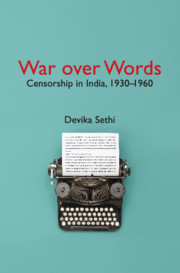Book contents
- Frontmatter
- Dedication
- Contents
- Acknowledgements
- List of Abbreviations
- Introduction
- Part I Guarding the State, Protecting the Public: Censorship Policies and Practices in the 1930s
- Part II Protests and Publicity: Banning Non-Indian Authors
- Part III Political or Military? Censorship in India during the Second World War
- Part IV The Censored Turn Censors: Freedom and Free Speech
- 7 Free Speech or Hate Speech? Partition and Censorship
- 8 ‘An Education in Realism’: The First Amendment to the Indian Constitution
- 9 The Living Biographies of Religious Leaders Controversy (1956)
- Conclusion
- Epilogue
- Bibliography
- Name Index
- General Index
9 - The Living Biographies of Religious Leaders Controversy (1956)
from Part IV - The Censored Turn Censors: Freedom and Free Speech
Published online by Cambridge University Press: 26 April 2019
- Frontmatter
- Dedication
- Contents
- Acknowledgements
- List of Abbreviations
- Introduction
- Part I Guarding the State, Protecting the Public: Censorship Policies and Practices in the 1930s
- Part II Protests and Publicity: Banning Non-Indian Authors
- Part III Political or Military? Censorship in India during the Second World War
- Part IV The Censored Turn Censors: Freedom and Free Speech
- 7 Free Speech or Hate Speech? Partition and Censorship
- 8 ‘An Education in Realism’: The First Amendment to the Indian Constitution
- 9 The Living Biographies of Religious Leaders Controversy (1956)
- Conclusion
- Epilogue
- Bibliography
- Name Index
- General Index
Summary
This chapter is a case study of a specific book which aroused controversy in both India and Pakistan. An investigation into the circumstances surrounding the publication as well as banning of this long forgotten book1 has much to tell us about the roots of present-day censorship debates and demands in India.
The Book
In September 1956, the reprinting of a book first published in the United States in 1942, titled Living Biographies of Religious Leaders, written by Henry and Dana Lee Thomas, led to agitation and communal violence in Uttar Pradesh, Madhya Pradesh (then Vindhya Pradesh) and West Bengal. The book, comprising short biographies of Moses, Luke, Joseph, Buddha, Prophet Muhammad and Gandhi, was not noticed in India in the years after the publication of its American edition. It was noticed only when printed in India as part of a collaboration agreement in 1955 between the original publisher and the Bombay-based Bhartiya Vidya Bhawan (BVB) specializing in low-price editions. The book carried a foreword by K.M. Munshi, then the Governor of Uttar Pradesh. The agitation over the book, followed by riots that erupted when rumour spread that the Gita had been burnt and torn in Aligarh, led to the death of 15 (Nehru's estimate)2/23 people (Time magazine's estimate), as hundreds more were arrested and curfew imposed in Aligarh and Jabalpur. When K.M. Munshi (who also happened to be the founder of BVB as well as a general editor of the series) was due to visit Bhopal in early September 1956, 5,000 people demonstrated against him, and he cancelled his visit. This was despite the fact that BVB had already announced that it was stopping the sale of the book, and that passages that had offended people would be removed in subsequent editions. Actively and most visibly involved in the agitation were students of Aligarh Muslim University, the Vice-Chancellor of which, Zakir Husain (later to serve as India's first Muslim president), had regretted the involvement of students of his university, reminding them that ‘… your action should have caused pain to the soul of the Prophet’.
What was found to be offensive in the book?
- Type
- Chapter
- Information
- War over Words , pp. 233 - 245Publisher: Cambridge University PressPrint publication year: 2019



